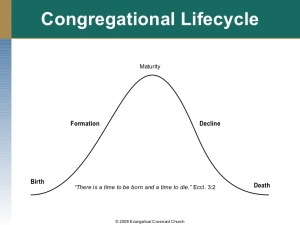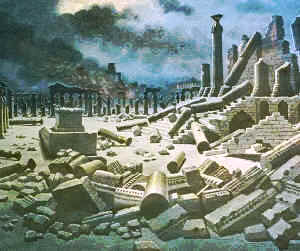Jeremiah’s Letter to the Exiles in Babylon
29:1 These are the words of the letter that the prophet Jeremiah sent from Jerusalem to the remaining elders among the exiles, and to the priests, the prophets, and all the people, whom Nebuchadnezzar had taken into exile from Jerusalem to Babylon.
5 Build houses and live in them; plant gardens and eat what they produce. 6 Take wives and have sons and daughters; take wives for your sons, and give your daughters in marriage, that they may bear sons and daughters; multiply there, and do not decrease. 7 But seek the welfare of the city where I have sent you into exile, and pray to the Lord on its behalf, for in its welfare you will find your welfare.
10 For thus says the Lord: Only when Babylon’s seventy years are completed will I visit you, and I will fulfill to you my promise and bring you back to this place. 11 For surely I know the plans I have for you, says the Lord, plans for your welfare and not for harm, to give you a future with hope. 12 Then when you call upon me and come and pray to me, I will hear you. 13 When you search for me, you will find me; if you seek me with all your heart, 14 I will let you find me, says the Lord, and I will restore your fortunes and gather you from all the nations and all the places where I have driven you, says the Lord, and I will bring you back to the place from which I sent you into exile.
Jeremiah 29:1, 4-7, 10-14
Becoming the community
What Jeremiah prophesied has now come to pass. Jerusalem has fallen, and the Jews have been hauled off to Babylon. Their worst fears have become their reality. And so Jeremiah writes a letter to the elders being held by King Nebuchadnezzar. What must they have thought? Many of them couldn’t have been young, and the life expectancy was not what it is today. This means that most of them would, in reality, never return back to Jerusalem. It would be their children and grandchildren who would make it back. Those receiving Jeremiah’s letter would, in all likelihood, die in captivity.
But they hear these beautiful words: 11For surely I know the plans I have for you, says the Lord
They are to hold fast to the trust they have in the Lord. And what does he advise them to do?
7 Seek the welfare of the city where I have sent you into exile, and pray to the Lord on its behalf, for in its welfare you will find your welfare.
This is because they should not expect their time of captivity to be short. They cannot act as an isolated nation of people staying within their own four walls. They will have to not only cope with their present situation of captivity, but also keep hope that one day it will get better, even as they wait patiently until that time. While the Hebrews are in captivity, they need to prepare themselves to sustain the nation for more than a generation to pass before they return.
These individuals in captivity, young and old, were likely never to see their homeland again. Yet, in our passage today, Jeremiah is advising them to become part of the community and the community was to become part of them. This went against much of what was natural to them. The Israelites were “God’s chosen people” and wanted to stay that way. They didn’t want change. They wanted to be able to act like they always have acted. They hoped everything would go back to the way it was.
The destruction of the Israelite city of Jerusalem in the book of Jeremiah is what we don’t want happening to us as a church. We don’t want to see the great thing that is our church come to an end. So, we are to remain a presence in the community.
The captives had to figure out how to change in a foreign land. The state of living for the captive Israelites of Babylon is the type of living you will find many people in our community suffering in. It is a state of living that puts a very low ceiling over our progress. These people often want change, but they need help, they need a connection with one of us. Once you connect and start moving towards growth, there are many changes that can bring real improvement.
Let me give you an example:
I worked a short summer program for the organization Boy’s and Girl’s Club. I have since learned that the program I witnessed was not necessarily what other clubs in other areas were doing, but this is what I found. On summer days, Monday through Friday, kids would get dropped off by their parents just before 10am. These were elementary and middle school kids, mostly from the poor neighborhoods. Another employee and I were assigned to direct the youngest group of kids. Schedules for daily activities were designated for each age group.
The kids found themselves engaged in art projects, learning exercises, in sports activities, and other things that even challenged their minds. As we built a secure environment of structure for the kids to occupy themselves within, we were able to watch over them and get to know them better. It was surprising how quickly my role felt significant when the kids started adding a “Mr.” in front of “James”. On the surface, that’s what the point of the program was: keeping kids busy with other kids their age.
That clearly links kids to make friendships and to have a fun summer. The deeper points to the program are significant. While kids are able to meet up with kids they didn’t know from their specific neighborhood’s elementary class, there was a real diversity of kids from both rich and poor, black and white families alike. The program was ultimately offered to provide a safe haven for kids to spend their summer days. What also became of the program one of the most important achievements was feeding all of those kids who wouldn’t otherwise have anything to eat. Living a life without the help of this program would look a lot difference.
Jeremiah told the Israelites that they had to change if they wanted their nation to survive the length of their captivity. The hardest part was, almost all of them would never live long enough to see the benefits of following Jeremiah’s advice in the choices they made. That may have been the most discouraging aspect of the whole situation; no matter what they did, they may never see the influences any of their choices made.
What I am thinking is that we – here in this congregation – need to connect with the reality that many of us will not see the growth of the seeds we plant or the fruit of the many invested personal resources offered to God in the collection plate for the benefit of the church.
This sanctuary has been standing here for over 50 years, but are we to assume that it will keep standing for another 50?
We could all make the personal commitment to commit our lives to attending this one church every Sunday until the end of our days (given that I don’t run you off before the end of this sermon). With just us, who will even remain after those 50 years have passed?
I want to put this gently, but I also want to illuminate the reality: We’re going to need some new members aren’t we?
I venture to say, not one of us wants to see the church pass away with its members? It unsettles us doesn’t it? To be honest, it is downright nerve-racking! That isn’t a good feeling.
(so we better not talk about it anymore….) (shall I change the subject?)
And yet, we hear that change is the only way to survive. And we want to do far more than surviving! The people of God were told they had to get it together or their way of life was going to fall out from beneath them. God’s nation of people had entered “survival mode.” In many ways we can relate to the feeling .
Ok, so now change is on our minds. Good, but what kind of change?
Whenever we think about change, right off the bat, remember this change is not short-term. Hope for a future is not found in our own lives, but in the lives of our children and our children’s children.
What can we do to awaken the movement of the Holy Spirit within the walls of this church that will continue to grow for years to come?
The change I’m proposing is probably not the change you expect. I don’t want you to try to be somebody different. I want you to be yourselves: Be who you are as a church! There are so many individual talents every single one of you has to offer. You owe it to God and yourself to find a way to share them. We have been given them so that we share them. Never in scripture will you find that we are to keep all our gifts to ourselves.
We are not separate from the community. We are not to consider ourselves to be set-apart, and certainly not set-above, the people of this community. Every person in Bath County is our sister or our brother.
We are called to build the One Body in Christ. The passage of scripture for the day tells of when the Jewish community were called by God to let in all people who they had in the past rejected and make them One covenant bound community.
The Israelites had finally lost their home to the Babylonians after years of defending it. They were doing what they thought they should to save their city. We need to be clear that they didn’t lose their city because they didn’t care about it, they loved their city very much. Probably more than any other civilization ever has. They tried to keep it safe from harm and keep it in their possession, and they fought hard for it. But they still lost it.
The trouble is that they weren’t doing what they should have been doing. They had the wrong focus, so that no matter how strong their efforts, they didn’t make the difference that was at the root of the problem. If they had tried just as hard but listened to Jeremiah’s words to them, then their efforts would not have failed.
 They focused on the city, as if that is what God most valued, and if they protected it, then God would save them. They were wrong. God’s punishment was never so that the Hebrews would not have a nation. In our scripture for the day, we hear the words to the Hebrews telling them to preserve the nation while in exile. The message was never about the purpose of keeping the city gates intact, it was about preserving the people. We see this because even in the midst of exile, the punishment they chose through not heeding the messages given them by Jeremiah, God continued to preserve the people, not the city the Hebrews spent all their misdirected energy working on protecting.
They focused on the city, as if that is what God most valued, and if they protected it, then God would save them. They were wrong. God’s punishment was never so that the Hebrews would not have a nation. In our scripture for the day, we hear the words to the Hebrews telling them to preserve the nation while in exile. The message was never about the purpose of keeping the city gates intact, it was about preserving the people. We see this because even in the midst of exile, the punishment they chose through not heeding the messages given them by Jeremiah, God continued to preserve the people, not the city the Hebrews spent all their misdirected energy working on protecting.
For forty years, God used Jeremiah to tell the Israelites to repent and turn to God.The temple was involved in serving God in their community, but the temple itself wasn’t the focus of faith.And understand, protecting the building that is our sanctuary is involved in serving God in our community, but that isn’t the focus. Becoming our community, creating a oneness with our community is our focus: People have always been the bottom line.
I hear the story of the Israelites and think of our own efforts to preserve that which is important to us, but not what is important to God. The church building is what we have become focused on protecting and not on protecting God’s people. Just like the Israelites, the scriptures and the very Word of God, tells us to focus on the people, and instead we focus on the dwelling.
Is this God’s house? Absolutely! This sanctuary was erected in honor of our Lord, as a holy resting place for the scriptures to be studied and comprehended, and as a place to perform the sacraments that bring people closer to God. This is surely God’s house! But God was said to dwell in Jerusalem, too, and yet, not even the Holy City of God continued to be a worthy dwelling for God. All because the actions and devotions of the Hebrews valued the physical dwelling built for God more than their actions displayed a value for the people of God.
We must do whatever we can to ensure God remains within these four walls. The way to ensure that is by sending the Spirit of God beyond these four walls.
Have we done this? Are our efforts merely keeping the doors of the church open so we don’t have to start preaching the Gospel.
Weeks ago, I presented an analogy of the body and related each part of the church to the parts of the body:
- The head is Christ – He holds the mission. [somebody tell the congregation what it is.
- [Heart] – It keeps us alive
- Our church vision – Where we are going.
- [Arms] – Gives us the ability to hold.
- Network of relationships inside and outside of the church – Who’s coming with us
- [Hands and feet] —– They leave the impressions on the outside world
- Programs – How we achieve our vision
- [Skeleton] —– Necessary to efficiency
- Structure
- Committees, Safe Sanctuary regulations, Rules in the Book of Discipline
- Planning,
- Structure
A valid question a curious church visitor may come to ask you: In what ways does this church help individuals grow spiritually? Let’s hope our answer is going to be better than “I’m not sure…”
What are the ministries of this church? How do we mission efforts to the people of this community?
- Ministry is my young family beginning in ministry. That is beautiful. It makes my heart glow to hear all of you say that, yet:
- How does this ministry grow the network of people connected to the church?
- Low-income housing
- How does this ministry grow the network of people connected to the church?
- How can we improve the living conditions for our tenants? Simply put, how does it compare to the comfort of our own home?
- How can we help them improve the state of their living?
- Food pantry of Owingsville
- How does this ministry grow the network of people connected to the church?
- Grocery running
- Days open
- Real stock of useful goods
- system of regulation
- Bethel: Sunshine baskets
- How does this ministry grow the network of people connected to the church?
- Perfect for keeping people feeling valued
- Great for strengthening new memberships
- Samaritan’s purse
- How does this ministry grow the network of people connected to the church?
- How does this ministry grow the network of people connected to the church?
How do those who are struggling in our community cope? The must know they can trust in love, the love we show them.
For the Hebrew people, love comes from the very heart of the Lord God. It comes from the secure knowledge that the people of Israel and Judah are never alone in their struggles. Their God has not abandoned them. Even though they will not see God for many years, they can still call upon the Lord and pray. And they know that the Lord will hear them. When they search for the Lord, they will find the Lord. Even though terrible things have happened, they can find comfort in knowing they are the beloved children of a God who loves them. They can depend on that, always.
For Christians, the love of God came to us in the form of a human being. And that love that the world experienced personally is now, by the power of the Holy Spirit, physically present in the form of many human beings living as the body of Christ.We have God’s love in the world, and God will never give up on us.
The people of our community don’t know that. Telling them isn’t enough for them to know it. The have to witness it.
We are the witnesses that display that love.
So what do we do? I leave you to think on that.

One thought on “Becoming Community”